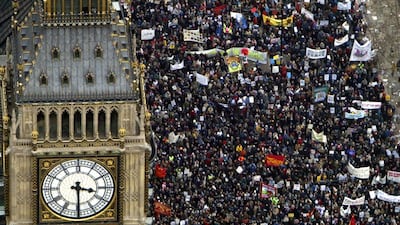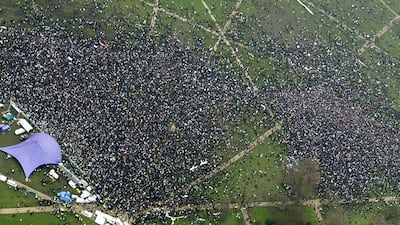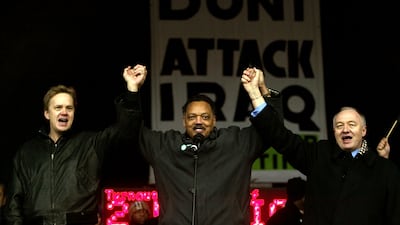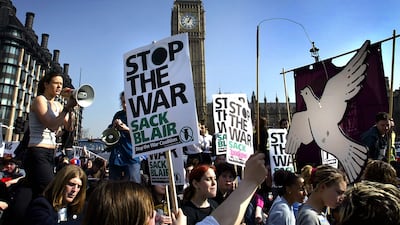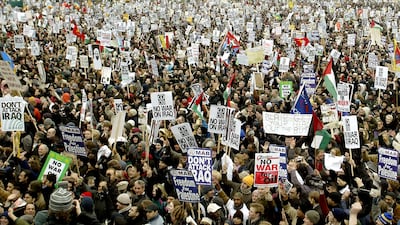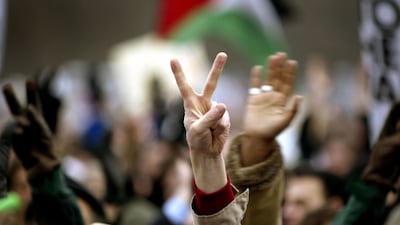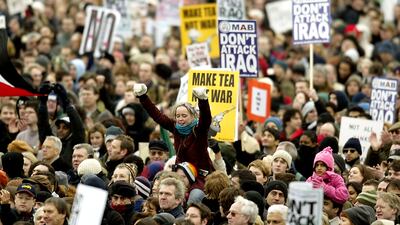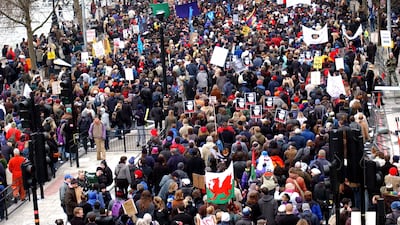There was a moment, walking among thousands in the brisk air of the grainy London afternoon, when I realised that Iraq, the country of my birth, had in fact much less to do than I first assumed with why so many people wanted to show their opposition to plans by the United States and its allies to invade it.
The Stop the War Coalition and other groups organised what would become, on February 15, 2003, the largest protests in the lead up to the invasion on March 20. The London demonstration was very large, reportedly close to 1 million, although simultaneously in Rome and Madrid there were even bigger protests.
Only days before, US secretary of state Colin Powell had given his infamous speech at the UN, presenting what he claimed was evidence of Iraq’s weapons of mass destruction — or WMD — and the threat they and dictator Saddam Hussein posed.
It was clear the UN would not be able to hold back the US and so it fell to ordinary people to voice their opposition so that — at the very least — other countries, including the UK, would not support the war. Seeing so many people out in force in London made us who were there believe we had at least a slim hope of having an impact on prime minister Tony Blair’s government.
I was part of a group of young friends — mainly British Arabs, including Lebanese, Palestinians, Syrians — who had planned to join in the march together. For months, the build-up to war had us discussing the pros and cons of an invasion and we could only agree on the likelihood of it actually happening and also that the evidence of WMDs was not convincing.

While we made our way on the police-lined circuit, including Whitehall and Trafalgar Square, which would eventually take us to the rally at Hyde Park Corner, I stopped in the street for a moment, letting a woman in a black burqa hop past me down Piccadilly, one arm pumping a sign up and down with the words “Hands off Al Aqsa” painted on it in black writing. There were many more issues in people’s minds than just Iraq.
Like the woman’s placard, I wondered if I even belonged here at this protest? I wanted to focus on Iraq. But was the February 15 demonstration solely against the war the US would imminently unleash or was it about everything else wrong with the world in which we lived in 2003? People had been bussed into London from all over the country, including by the Muslim Association of Britain. Some were clearly there just to have a day out.
And I had to ask if I was there because of my feelings about the war or my need to discover the country of my birth or because I was struggling? Struggling … as a twenty-something making a life … to be an artist … to find meaning … to see a clear horizon.
Yes. All these things were true and also I wanted to know about Iraq’s future.
Since the 1990 invasion of Kuwait, it seemed Iraq had no real future with Saddam Hussein. Under his brutal regime, the country had not kept up with progress. Opportunity was denied to its people unless they were committed Baath Party members. Saddam was squandering Iraq’s oil wealth on burnishing his damaged reputation by supporting myriad causes in other countries while international sanctions reduced the quality of life and well-being of his people. By 2003, Iraq had not been what could be defined as a modern country in a long time.
The plan to launch a war on Iraq by the administration of US president George W Bush offered both a potential salvation for the people there and also the likelihood of more suffering and misery. Saddam had to be removed for the sake of Iraqis everywhere but the cost always seemed so high and unfairly loaded on to Iraqis.
When the US would finally unleash “shock and awe” on Iraq, any military resistance would collapse in a matter of a few weeks.
The February 15 protesters understood how bizarre the paradigm around the war was and there was very little trust in the Americans. There was real anger that Blair had chosen to side with them. He had been viewed until then as a pragmatic and rational leader. Now, he seemed to take on a messianic persona, making exaggerated claims and showing faith in flawed intelligence.

On a stage in Hyde Park that Saturday, in front of tens of thousands, I remember MP George Galloway crying “Viva La France” in honour of their refusal to support the US. Galloway and others revelled in the anti-establishment fervour that was on display in front of them. London mayor Ken Livingstone was also among the speakers.
I have no recollection of Rev Jesse Jackson being one of them, however, but reports say he was. The overall atmosphere was one of a gig rather than a protest. My memories are of my own emotional discomfort. As the crowd erupted in cheers around me at Galloway’s antics, I felt Iraq slipping away from the centre of our collective thoughts. Did we not need to acknowledge that, without war, we would need to find another way to help the Iraqi people be free of Saddam? This was not discussed in any meaningful way because the truth was that war was coming no matter what. President Bush had already decided.
On February 15, then, was there too much glee in Hyde Park about having the moral high ground, about being certain you are right and knowing for certain your enemies are wrong? For sure. Did that moment represent a kind of echo chamber that we find way too common on social media? Yes. Was it pointless? No. February 15 showed the UK government that many of its citizens disagreed with what it intended to do and, in subsequent years, the scale of the opposition in 2003 meant that reviews, inquests and inquiries would happen.
Published 13 years later, the Chilcot report’s findings were scathing of the manner in which the Blair government took Britain into the war. The origins of that central criticism can be found in the February 15 protests.
For me, by the end of the day as I walked home from Hyde Park, Iraq and its people felt very far away from us despite being the spoken reasons for why so many people gathered in London and in cities around the world. Yes, the opposition to the war was about much more than one country or one conflict but it could not stop it all the same.

This all added to my personal confusion. I was grappling with my one question and I could not find a satisfactory answer: was an invasion of Iraq the right or wrong approach?
Three days before the February 15 protest, I performed in a play I had written about the looming war at the Cockpit Theatre, off Lisson Grove. The play was titled Out There and was the result of the inner conflict I felt. In the story, a young Iraqi living in London travels to Baghdad before the war to understand the place that the country held in his life.
The play reflected my own contradictions; I wanted Saddam Hussein removed but did not want to see any innocent Iraqis pay the price for it. My apprehension about the US push for war was more about Iraq and perhaps less centred on the false reasons being given about it. That is where I may have differed from many others on the streets of London that Saturday.
I told Asharq Al Awsat newspaper in an interview afterwards that I simultaneously both “wanted and rejected” the war. It was both right and wrong, I felt.
In a letter published by The Times on March 30, 2003, I wrote: “As an Iraqi, I do not believe the war in Iraq will solve the problem of terrorism, and taking out Afghanistan and Iraq will not create any lasting stability.”
Twenty years on, the inner turmoil hasn’t really gone away. I still remain at odds within myself about it all.
